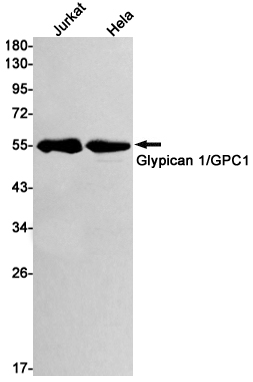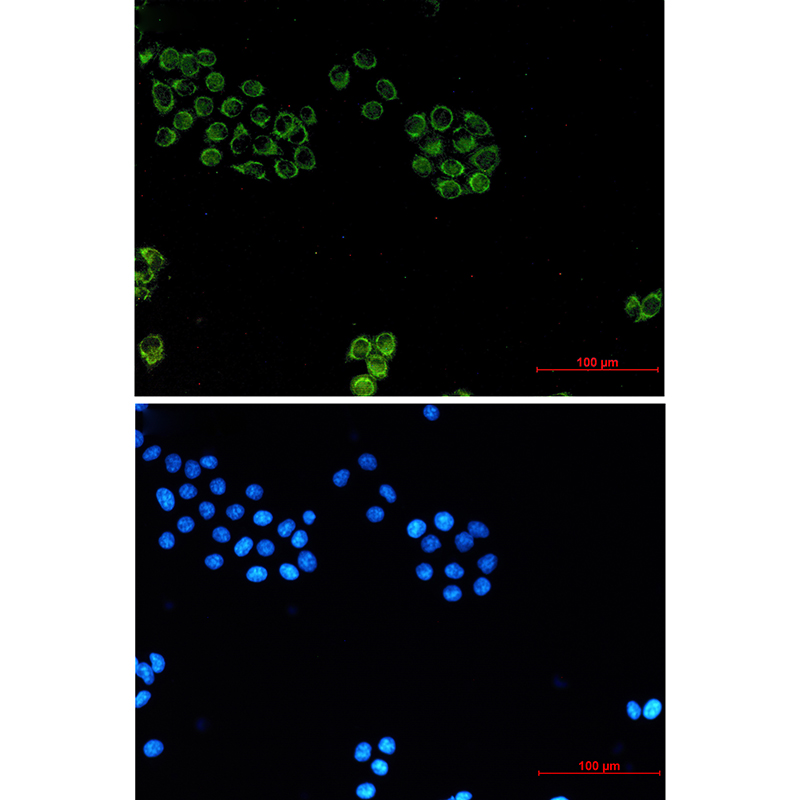

| WB | 咨询技术 | Human,Mouse,Rat |
| IF | 咨询技术 | Human,Mouse,Rat |
| IHC | 咨询技术 | Human,Mouse,Rat |
| ICC | 1/50-1/200 | Human,Mouse,Rat |
| FCM | 咨询技术 | Human,Mouse,Rat |
| Elisa | 咨询技术 | Human,Mouse,Rat |
| Aliases | glypican |
| Entrez GeneID | 2817 |
| WB Predicted band size | Calculated MW: 62 kDa; Observed MW: 55 kDa |
| Host/Isotype | Rabbit IgG |
| Antibody Type | Primary antibody |
| Storage | Store at 4°C short term. Aliquot and store at -20°C long term. Avoid freeze/thaw cycles. |
| Species Reactivity | Human |
| Immunogen | A synthetic peptide of human Glypican 1/GPC1 |
| Formulation | Purified antibody in TBS with 0.05% sodium azide,0.05%BSA and 50% glycerol. |
+ +
以下是关于Glypican 1抗体的3篇参考文献概览:
---
1. **文献名称**: *Glypican-1 identifies cancer exosomes and detects early pancreatic cancer*
**作者**: Melo, S.A. et al. (2015)
**摘要**: 该研究提出Glypican 1(GPC1)在癌症外泌体(exosomes)中特异性高表达,可作为胰腺癌早期诊断的生物标志物,并通过抗体检测验证其在临床样本中的敏感性。
---
2. **文献名称**: *Glypican-1 modulates BMP/Smad signaling in mesenchymal cells*
**作者**: Filmus, J. et al. (2008)
**摘要**: 文章揭示了Glypican 1通过调控BMP/Smad信号通路影响间充质细胞的增殖与分化,利用特异性抗体阻断实验证明其与生长因子结合的分子机制。
---
3. **文献名称**: *Role of glypican-1 in regulating T cell responses and autoimmune disease*
**作者**: Couchman, J.R. et al. (2018)
**摘要**: 研究通过Glypican 1抗体干预实验,发现其在调节T细胞活化和自身免疫疾病中的关键作用,提示其作为免疫治疗靶点的潜力。
---
如需具体文献来源,建议通过PubMed或Google Scholar输入标题进一步查询全文。
Glypican 1 (GPC1) is a member of the glypican family of heparan sulfate proteoglycans anchored to the cell membrane via a glycosylphosphatidylinositol (GPI) moiety. It plays critical roles in regulating cellular signaling pathways by interacting with growth factors, morphogens, and extracellular matrix components, including Wnt, fibroblast growth factors (FGFs), and Hedgehog proteins. GPC1 is involved in embryogenesis, tissue homeostasis, and disease processes such as cancer and neurodegeneration. Antibodies targeting GPC1 are essential tools for studying its expression, localization, and function in both physiological and pathological contexts.
GPC1 antibodies are widely used in techniques like immunohistochemistry, Western blotting, flow cytometry, and immunofluorescence to detect GPC1 in tissues or cell lines. Research has highlighted GPC1's dual role in cancer—acting as a tumor suppressor or promoter depending on the context—and its potential as a biomarker in cancers like pancreatic, breast, and glioblastoma. Additionally, GPC1 is implicated in neurodegenerative diseases, such as Alzheimer’s, due to its altered expression in brain tissues.
Developing specific GPC1 antibodies requires careful validation to ensure minimal cross-reactivity with other glypicans. Some antibodies target epitopes in the core protein or heparan sulfate chains, influencing their applications. Recent studies also explore GPC1’s presence in extracellular vesicles, underscoring its diagnostic and therapeutic potential. Overall, GPC1 antibodies remain vital for unraveling the protein’s multifaceted roles in health and disease.
×